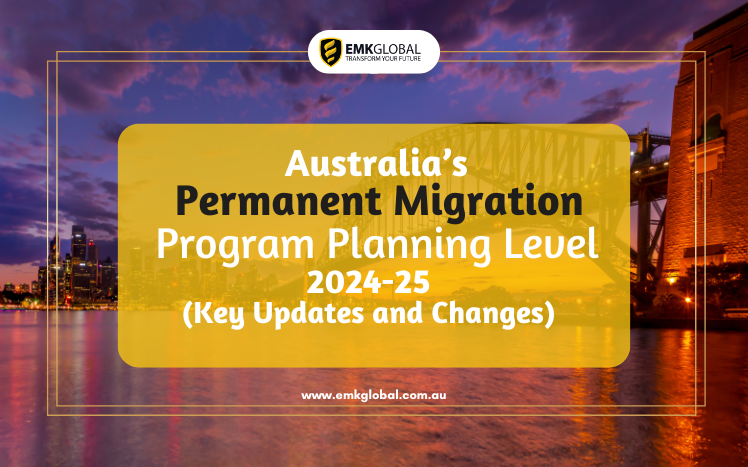On May 14, 2024, the Australian government unveiled its 2024–25 Federal Budget, which includes significant changes to the Permanent Migration Program. The new program outlines a total of 185,000 spots available for migrants, aiming to address skill shortages in various sectors and expedite visa processing, particularly in regional Australia. Additionally, the program emphasizes strengthening community and family ties by recognizing the social contributions of migrants.
Key Takeaways of the 2024-2025 Permanent Migration Program
The 2024-2025 Permanent Migration Program is divided into three main categories:
- Skill Stream: 132,200 places (71% of the program)
- Family Stream: 52,500 places (28% of the program)
- Special Eligibility Stream: 300 places
Total Migration Spaces: 185,000
Major Adjustments and Their Impacts
New Visa Categories and Requirements:
- National Innovation Visa: By the end of 2024, the Global Talent Visa and Business Innovation and Investment Visa will be replaced by the National Innovation Visa.
- Temporary Skill Shortage Visa (subclass 482): The work experience requirement will be reduced from two years to one year starting November 23, 2024.
- Work and Holiday Visa: A new pre-application procedure will be implemented starting in the 2024–2025 fiscal year.
- International Students: The government will collaborate with foreign education providers to limit the number of international students during specific periods.
- MATES Program: This initiative will allow 3,000 Indian graduates with specific skills to live and work in Australia for up to two years.
Breakdown of the Skill Stream
The Skill stream, with an allocation of 132,200 places, aims to boost Australia’s economic productivity and address skill shortages, particularly in regional areas.
- Employer Sponsored Visa Changes:
- Increased from 36,825 visas (2023-2024) to 44,000 visas (2024-2025).
- Expanded pathway to permanent residence via the Temporary Residence Transition Stream starting November 2023.
- State/Territory Nominated Visa Changes:
- 33,000 visas for State/Territory Nominated category and 33,000 for the Regional visa category.
- These categories constitute 50% of the Skill stream and 36% of the overall planned level.
- Aim to attract skilled migrants and enhance the economy of Regional Australia.
- Skilled Independent Visa (Subclass 189) Changes:
- 16,900 visas allocated for 2024–2025, reduced from 30,375 in the previous year but higher than COVID-era levels.
- Business Innovation and Investment Program (BIIP) Changes:
- Reduced from 1,900 visas (2023–2024) to 1,000 visas (2024–2025).
- BIIP will be closed permanently from July 2024, with a transition to the National Innovation Visa.
- Global Talent Visa Changes:
- Reduced to 4,000 visas for 2024–2025.
- To be replaced by the National Innovation Visa, which will cater to highly talented migrants, including top-performing business owners, significant investors, and global researchers.
Breakdown of the Family Stream
The Family stream remains at 52,500 allocations, maintaining its vital role in the Australian immigration system by enabling family reunification.
- Partner Visas:
- 40,500 places available, facilitating the reunification of families and providing a pathway to Australian citizenship.
- Child Visas:
- 3,000 places for the Child Visa Program, allowing Australian citizens to sponsor their dependent, adopted, or orphaned children.
Special Eligibility Stream
This stream, with 300 places, addresses unique situations such as permanent residents returning to Australia after an extended period overseas.
Conclusion
The 2024-2025 Permanent Migration Program reflects Australia’s strategic approach to addressing economic needs and enhancing community ties through targeted visa categories and streamlined processes. These changes are set to meet the demands of a growing economy while ensuring the social integration of migrants.


